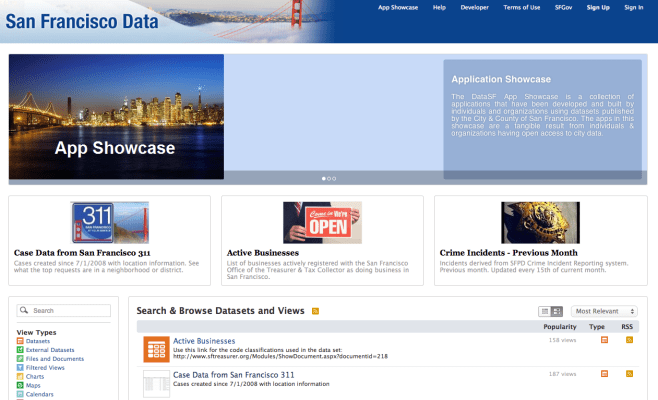With 30,000 tech jobs already in town and more (hopefully) on the way, San Francisco has been making a big push to make its city as friendly as possible to entrepreneurs. In January, we saw Mayor Ed Lee, Ron Conway, and former TechCrunch CEO Heather Harde launched sfCITI, a committee which focuses on hiring — both placing and training competent programmers and just generally bringing smart people into San Francisco’s workforce.
Last month, the city complemented its hiring committee by announcing a new initiative again aimed at making the city more relevant to its chief industry, called the 2012 Innovation Portfolio, which helps founders, as Eric wrote at the time, do everything from “completing the paperwork for creating a company, to giving developers new access to city data, to actually testing out tech products at City Hall itself.”
Today, Mayor Lee unveiled data.SFgov.org, a cloud-based open data site and the successor/replacement to DataSF.org. The city is adopting cloud services, “social citizen interfaces,” and APIs to power its new open data site, all in an effort to provide a more robust, technologically sound infrastructure that can drive innovation, access to information, engagement, and government efficiency.
Mayor Lee said in his announcement:
The future of San Francisco, as the world’s first 2.0 City, is greatly enhanced by a deeper integration with the local technology ecosystem, and by promoting the frictionless flow of information and feedback between the city and our residents. It’s only natural that we move our Open Data platform to the cloud and adopt modern open interfaces to facilitate that flow and access to innovation.
According to San Francisco’s Chief Innovation Officer Jay Nath, the upgrade today aims to expand access to information, while enhancing cost efficiencies and speed of execution. The San Francisco Open Data Cloud offers easy-to-use citizen interfaces that let the non-technical explore data, including visualizations, and share relevant info across the Web. On top of that, it offers “automatic full-text indexing of every data set’s content” in order to improve online search and the ability to “download the data in multiple open, machine-readable formats.” The initiative also includes automatic API access to every data set, including technical support and online developer resources — aiming to lower the barriers for civic developers.
Nath tells us that the city originally launched its open data efforts in August 2009 and, since then, have developed over 60 apps and published over 200 datasets. What’s cool is that, in order to facilitate its new data initiatives, it’s calling on a data sharing startup — from Seattle no less — called Socrata.
The city’s Chief Innovation Officer said that the startup allows the city to share data in multiple formats (JSON, CSV, etc.) and allows non-developers to easily visualize that data in maps, charts, and so on, with the ability to post to their own blogs — like YouTube videos, for example.
As you may have guessed, the Seattle-based, VC-backed startup provides a cloud-based platform for aggregating data from multiple sources, then disseminates it as interactive information through web, app, social, and API interfaces. Socrata has focused on the public sector in particular, where it’s enabled open initiatives at the federal, state, and local level, including work for New York, Chicago, Seattle, as well as Data.gov, the United Nations, Kenya, and so on.
It’s a credit to San Francisco that these kind of open data initiatives were experiments two years ago when the city launched DataSF.org, and now those cloud technologies have grown by leaps and bounds, and it’s looking to again stay ahead of the curve with a full suite of citizen, social, and programmatic interfaces — not all things you’d necessarily immediately associate with government services. But if the cloud can make it more cost-effective and agile, there’s no reason not to.
It also helps that the city recently received a $5 million federal grant for a workforce-training program, specifically for IT jobs.
For more, check out the San Francisco Data here.
